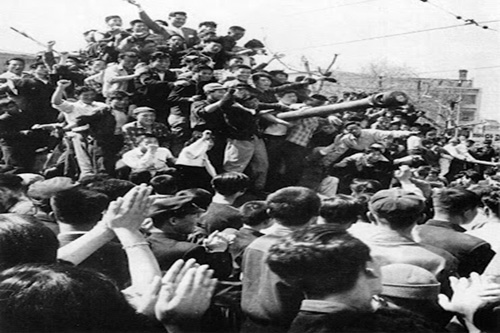The Gwangju Uprising and the Occupy Movement
By George Katsiaficas, Professor,
Dept. of Humanities and Social Science, Wentworth Institute of Technology
At first glance, the armed citizens’ uprising that erupted in response to severe military brutality beginning on May 18, 1980 may appear to be worlds apart from the relatively peaceful protests against the corruption of the global financial elite (the 1%) that resulted in occupations of hundreds of public places in the United States last year. The political and cultural contexts of these two social movements are strikingly different from each other, and their short-term outcomes have little in common: the US-mandated onslaught of the South Korean military on May 27, 1980 involved tanks, helicopters and guns, resulting in scores of people being killed, wounded, and arrested, while the occupy movement was cleared out of the parks and squares relatively peacefully as last winter approached.
Despite these apparent divergences in the two movements, they share essential dimensions, so much so that I believe we can comprehend them as strikingly similar to each other insofar as they are based upon principles of:


1. Autonomy: they arose outside the realm of political parties and remain distinct from them.
2. Direct democracy: within their deliberations, participants naturally congregated together according to principles of direct democratic discourse and deliberation; they contained a diversity of viewpoints that existed simultaneously with each other.
3. International solidarity: these movements naturally emerged and embraced people from around the world. During the Gwangju Uprising, foreigners freely walked the streets. Baptist missionary Arnold Peterson reported that his car, flying an American flag and with a large sign reading “Foreigners’ Car,” was cheered by people in the streets. Alongside Gwangju people’s conscious rejection of regionalism was international solidarity. In the midst of the struggle, the Choson University Committee for Democratic Struggle referred Gwangju to Vietnam: “In the city of Gwangju, just being young is a crime, and the young are condemned to be crippled for life or killed…Alas, the genocide of unarmed people in Vietnam is being repeated upon our own people.”
4. Eros Effect: Love, not hatred, was at the core of these movements. Participants developed strong feelings of identification with each other; crime rates dropped in the cities where these events transpired (including in Oakland, California in 2011, where the police chief secretly informed the mayor that the crime statistics were much lower during the Occupy Oakland events). Rev. Park Hyung-kyu observed that the Gwangju Uprising, “…with its warm bonding among citizens and self-controlled order, demonstrated the beauty of human love that blossomed in the midst of fierce resistance.” Sociologist Choi Jungwoon developed the notion of the “absolute community” to describe the collective energy and love which arose among Gwangju people as they battled the brutality of the paratroopers and drove the military out of the city.
5. Occupation of public space and decommodification of everyday life. During such moments, thousands of citizens change the routines of daily life. Instead of going to work or school, they congregate at the epicenter of the revolt and devote themselves entirely to the movement’s needs. The Gwangju Uprising found its natural home around the fountain in front of Province Hall. Similar occupations of public spaces for the movement to formulate itself and prepare for actions took place in:
The Sorbonne in Paris in May 1968
Yale University In May 1970
Around the Bo tree and in Thammasat University in 1973 Bangkok
EDSA in February 1986 in Manila
Shwe Dagon pagoda in Rangoon in 1988
Tiananmen Square in Beijing in 1989
The jungles of Chiapas after 1994
Tahrir Square in Cairo in 2011
In all the cases listed above, the movement spread beyond the boundaries of the city—and nation—in which it first emerged. The Gwangju Uprising resulted in more than a dozen cities and towns in Jeolla province finding citizens’ uprisings, and if not for the military’s cordon around the city, may have resulted in a nationwide uprising against Chun Doo-hwan. It became an inspiration for democratization movements throughout Asia, and as word of the Gwangju Uprising spreads, it animates action everywhere.
Instances of the spread of movements across borders, involving a process of mutual amplification and synergy, are significant precursors for future mobilizations. In the period after 1968, as the global movement’s capacity for decentralized international coordination developed, besides the Occupy movement, five other episodes of what I call the international “eros effect” can be discerned:
1. The disarmament movement of the early 1980s
2. The wave of East Asian uprisings in the 1980s and 1990s
3. The revolts against Soviet regimes in East Europe from 1989
4. The alterglobalization wave and anti-war mobilizations on February 15, 2003
5. The Arab Spring of 2011
Since World War 2, humanity’s increasingly awareness of our own power and strategic capacities has been manifest in sudden and simultaneous contestation of power by hundreds of thousands of people. A significant new tactic in the arsenal of popular movements, the eros effect is not simply an act of mind, nor can it simply be willed by a “conscious element” (or revolutionary party). Rather it involves popular movements emerging as forces in their own right as ordinary people take history into their own hands.
Humanity’s unending need for freedom constitutes the planet’s most powerful natural resource. As we move into the 21st century, the Arab Spring provides empirical evidence of the growing consciousness of ordinary people who go into the streets to change history. In 1968, “the whole world was watching.” Today, it is increasingly the case that the whole world is awakening. Recent Asian insurgencies, following the Gwangju Uprising, will help inform future uprisings. Sad and joyous, full of suffering while bringing forth tears of happiness, uprisings are moments of extreme desperation, during which human hearts act according to people’s fondest dreams. By understanding these dreams and remaining true to them, we become capable of a future of freedom.
George Katsiaficas 교수
tribune1968@cnumedia.com

